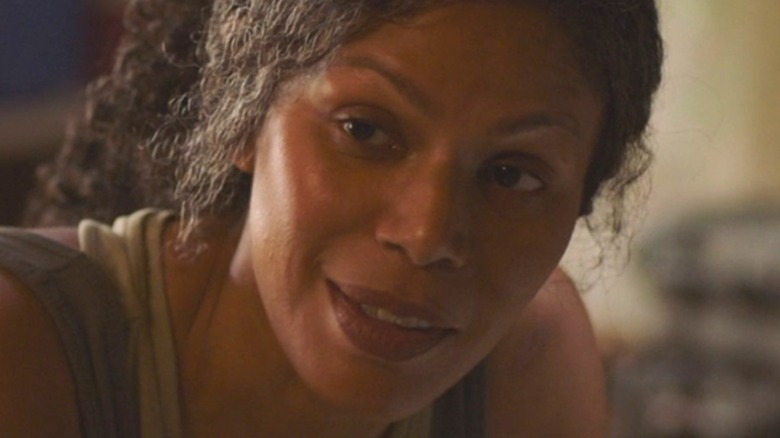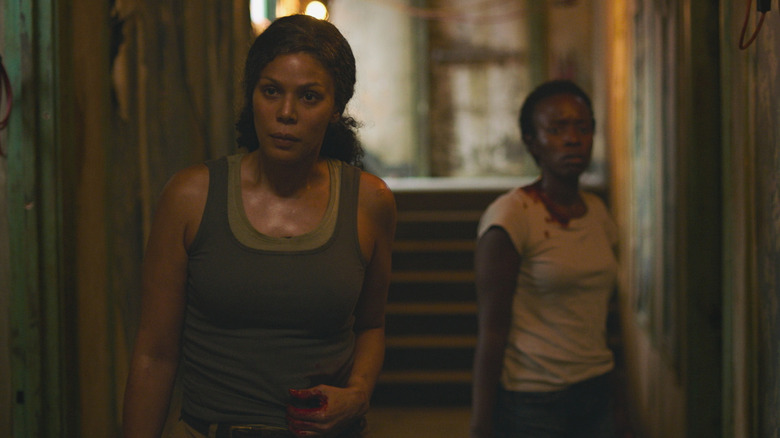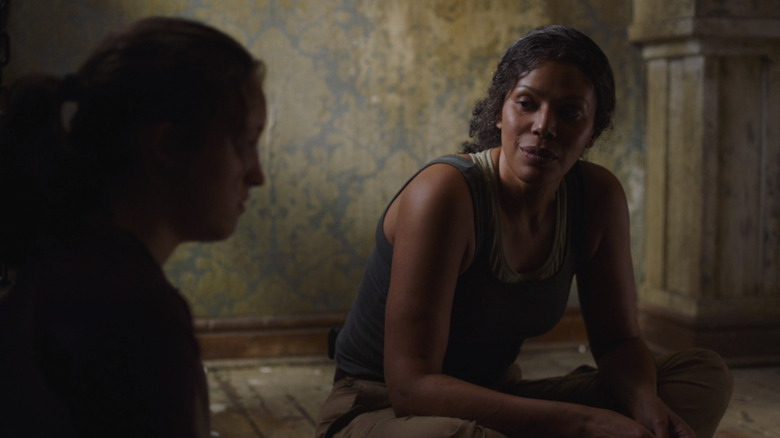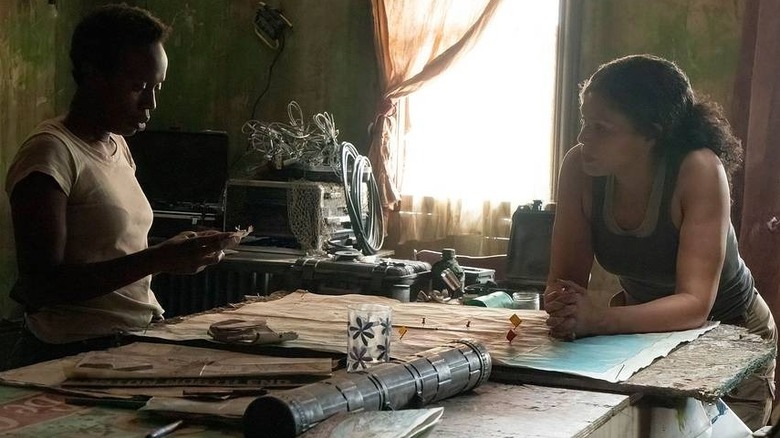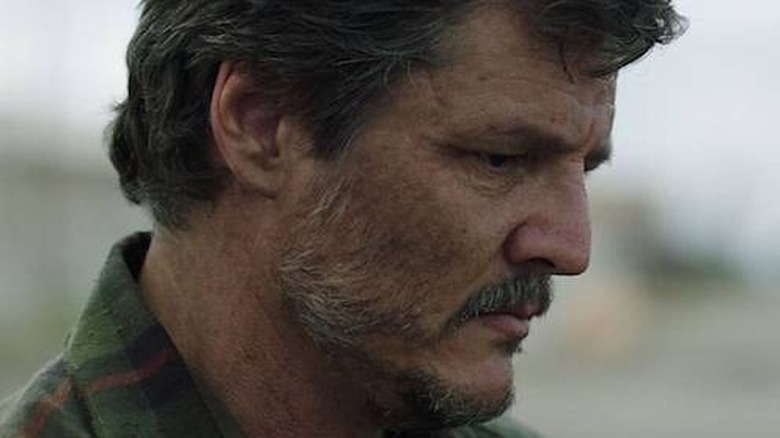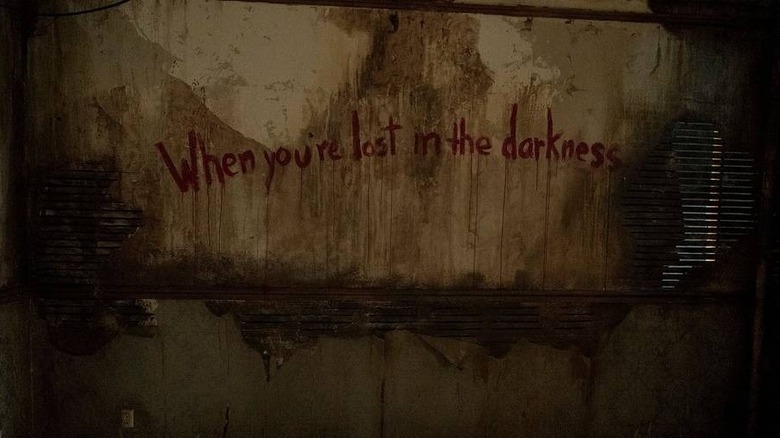The Last Of Us Makes Significant Changes To Ellie And Marlene's Relationship (& Why This Could Be Trouble)
Contains spoilers for "The Last of Us" Season 1, Episode 1
As Neil Druckman, the creator of "The Last of Us," told Nerd Reactor in 2013, "For the origins of the game, the high[-]level goal was to see if we can do a whole game based on a relationship. We started the story with two characters who don't know each other, barely even like each other. Through game play, through story, through art, through music, and by the end of it, you as a player will totally buy that these characters are willing to do anything and everything for each other."
To succeed as an HBO television series, "The Last of Us" was always going to need to make significant changes (or else audiences would have needed to get really into pallets and ladders). To Druckmann and series co-creator Craig Mazin's ("Chernobyl") credit, many of the changes showcased in the premiere all but prove that no one besides them could craft an adaptation so lovingly faithful in its deviation and expansion. And yet certain other changes threaten the integrity of the project altogether.
Of all the aspects for the series to tweak, it's curious that they would tamper with the relationships. For a game built on players' investment in the careful history and interactions between characters, translating this to a medium that thrives on such writing should have been simple and rewarding for all involved. And yet the creative team chose to drastically recontextualize one of the game's central relationships: that of Ellie and Marlene. While their friendship may seem inconsequential to what Joel and Ellie develop throughout the game, diminishing it gravely undermines elements of Druckmann's original story — especially its infamous climax.
Marlene's relationship with Ellie endears her to players of the game
In the video game, the player is introduced to Ellie in a shocking yet effective way. As Joel carries a critically injured Marlene into her apartment, Ellie assumes him dangerous and lunges from behind the door with a small knife. Her very first line in the entire game is "Get the f*** away from her!" This line of dialogue is key because it clarifies that Ellie is acting out of not self-preservation but concern for her friend. In this scene, Neil Druckmann quickly and economically establishes Ellie as brave, selfless, and caring while strongly implying that Marlene is a reliable caregiver. To players who have so far experienced nothing but selfish survivalism, this sequence introduces Marlene and Ellie as refreshing figures of hope.
While the video game accomplishes all this (and more) in less than two minutes, the series spends roughly six minutes without revealing much about Ellie's (Bella Ramsey) genuine personality. Marlene and Ellie's mutual care, respect, and trust for each other give players something hopeful to latch on to and emotionally invest in very early in the game, but on the TV show, any semblance of their friendship has been erased, and without it, both characters are as imperceptible as everyone else.
Without Marlene, Ellie has no stake in the Fireflies
Shortly after Marlene entrusts Joel with Ellie's safety, a brief interaction in the game reveals that Marlene has been taking care of Ellie since her mom passed away. As such, it can be inferred that she's been more or less raised with the ideology of the Fireflies. Though she claims not to be an "official" member, it's clear that Ellie believes in what they stand for. What's more, this belief is narratively rooted in her feelings for Marlene and ultimately pushes her through the game's darkest moments.
Arguably the most consistently damaging aspect of Marlene and Ellie's altered history is that HBO's Ellie now has no personal stake in the Fireflies' cause. Without this investment, it's hard to understand why she continues with Joel (Pedro Pascal) on their journey when she very clearly wants to be left to her own devices. Where in the video game, she fights through enemies human and otherwise for a future she has clear, unwavering, and optimistic faith in, she seems to trudge along in the series out of obligation. One might argue that she embarks on the mission simply because "it's the right thing to do."
It already seems as though the writers will eventually try to pin Ellie's conviction on an unseen history with Marlene (Merle Dandridge) or something to do with her mother. In either case, it's a shame if a series with so much screen time has to rely on off-screen events and interactions to motivate one of its central protagonists.
The audience needs to trust Marlene for the finale to be effective
Neil Druckmann's establishment of Marlene as a reliable caregiver not only helps players empathize with her as a character in the context of a story about family but also slyly conceals the game's final twist. What really sets "The Last of Us" apart is that it manages to be both emotionally arresting and dramatically surprising all at once.
Marlene is immediately introduced as a hardened revolutionary who will risk anything for her cause. Like any good storyteller, Druckmann lays his cards on the table from the start — what makes him brilliant is that he still manages to surprise you by the end, without sacrificing anything he's built previously.
This has partly to do with the original story's unparalleled thematic cohesion and partly to do with how well Druckmann humanizes these characters from the start. In fact, he does this so well that you almost forget extinction looms just over the horizon. Marlene — and the Fireflies by extension — is quite refreshingly presented as a hopeful figure in a bleak future. By making Marlene a reliable character with a deep emotional attachment to Ellie and seemingly just goals, players aren't primed to expect what she'll do to see those goals through.
Joel and Marlene need to have one critical trait in common
Contains spoilers for the video game "The Last of Us," from which the HBO series "The Last of Us" was adapted
Neil Druckmann recently told The New Yorker that he views "The Last of Us" as an exploration of the limits of the unconditional love a parent has for their child. For the climax of this exploration to be satisfying, Joel and Marlene need to have one thing in common by the time they see each other again in Salt Lake City: They both need to love Ellie like a daughter.
"Whatever it is you think you're going through right now is nothing to what I have been through," she tells Joel at the start of the game's final showdown. "I knew her since she was born. I promised her mother I would look after her." Unlike in the series, wherein Ellie is essentially Marlene's prisoner, Marlene has seemingly raised Ellie as though she were her own daughter. Through Marlene, Druckmann is able to present the possible limits of unconditional love — and then show the devastating consequences of Joel's willingness to surpass them.
The drama of this finale is derived from the similarity in how Marlene and Joel feel about Ellie. It creates this idea that, with the right argument, one of them could realistically persuade the other. In the series, since Ellie has only known Marlene for a day or two, it's hard to imagine Druckmann and Craig Mazin achieving the same level of payoff in this showdown. Marlene is a soldier, not a parent — of course her treatment of Ellie would differ from Joel's. In this context, the conflict shifts from a contest of family to one of ideology.
Don't lose hope yet...
At present, neither Marlene nor Ellie is as interesting as she should be. Still, it isn't impossible that the HBO series could pull off a satisfying finale even with their lacking relationship.
Aside from Neil Druckmann and Craig Mazin's well-established talents as storytellers (talents that are still very much on display throughout the series) and Bella Ramsey and Merle Dandridge's exceptional performances as their respective characters, the show has proven its ability to offer something new. What they've built so far may not work especially well for the game's climax, but perhaps it will be perfectly suited to some new twist they've taken for the series.
There's also a possibility that future episodes will give Marlene and Ellie's relationship more texture — exploring the circumstances that led Marlene to leave Ellie with FEDRA seems like a potentially fascinating route. Perhaps Marlene's sacrifice will somehow mirror this moment, giving the final act the mutual heartbreak it desperately needs.
